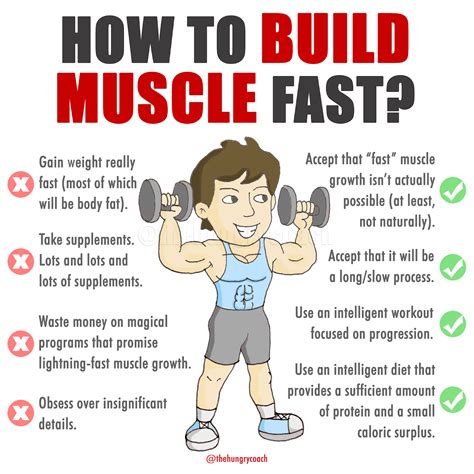How to Gain Muscle Fast: A Comprehensive Guide
Want to pack on muscle mass quickly? Building muscle takes dedication and a strategic approach, but with the right plan, you can see significant gains in a relatively short amount of time. This guide will walk you through the essential steps to help you achieve your muscle-building goals faster.
1. Prioritize Progressive Overload
Progressive overload is the cornerstone of muscle growth. It simply means consistently challenging your muscles with progressively heavier weights, more reps, or more sets over time. Your muscles adapt to the stress you place on them, and to continue growing, you must continually increase that stress. This doesn't mean lifting to failure every single workout, but it does mean aiming for consistent improvement.
How to Implement Progressive Overload:
- Keep a Training Log: Track your workouts, noting the weight, reps, and sets you perform for each exercise. This allows you to monitor your progress and ensure you're consistently increasing the demands on your muscles.
- Increase Weight Gradually: Aim to increase the weight you lift by a small amount (2.5-5 pounds) each week or every other week, depending on your progress.
- Increase Reps or Sets: If you're unable to increase the weight, focus on increasing the number of reps or sets you perform.
- Vary Your Exercises: Periodically incorporate new exercises or variations to stimulate muscle growth from different angles.
2. Focus on Compound Exercises
Compound exercises, which work multiple muscle groups simultaneously, are far more effective for building muscle mass than isolation exercises, which target only one muscle group. These are the cornerstones of any effective muscle-building program.
Best Compound Exercises:
- Squats: Target quads, glutes, hamstrings.
- Deadlifts: Work the entire posterior chain (back, glutes, hamstrings).
- Bench Press: Develop chest, shoulders, and triceps.
- Overhead Press: Strengthens shoulders and triceps.
- Rows: Build back and biceps.
3. Maintain a Caloric Surplus
To build muscle, your body needs more calories than it burns. This is known as a caloric surplus. Consume enough calories to fuel your workouts and support muscle protein synthesis. Focus on consuming high-quality calories from whole foods.
4. Prioritize Protein Intake
Protein is the building block of muscle tissue. Aim for a protein intake of 1.6-2.2 grams of protein per kilogram of body weight (0.73-1 gram per pound) daily.
Excellent Sources of Protein:
- Lean meats: Chicken breast, turkey, fish.
- Eggs: A complete protein source.
- Dairy: Greek yogurt, cottage cheese.
- Legumes: Lentils, beans.
- Protein powder: A convenient supplement to help meet your daily protein needs.
5. Get Enough Sleep
Muscle growth and repair occur primarily during sleep. Aim for 7-9 hours of quality sleep per night. Lack of sleep can hinder muscle growth and overall recovery.
6. Stay Hydrated
Water is crucial for numerous bodily functions, including muscle protein synthesis and nutrient transport. Drink plenty of water throughout the day.
7. Listen to Your Body
Rest and recovery are just as important as training. Don't push yourself too hard, especially when starting out. Allow your muscles adequate time to recover between workouts. Pay attention to your body's signals and don't hesitate to take rest days when needed.
8. Consider Supplementation (Optional)
While not essential, certain supplements can support muscle growth. Creatine is a popular and effective supplement that has been shown to improve strength and power output. Whey protein is another popular option for boosting protein intake. Always consult with a healthcare professional before starting any new supplement regimen.
Disclaimer: This information is for general knowledge and informational purposes only, and does not constitute medical advice. Consult with a healthcare professional or certified personal trainer before starting any new workout or diet plan.
